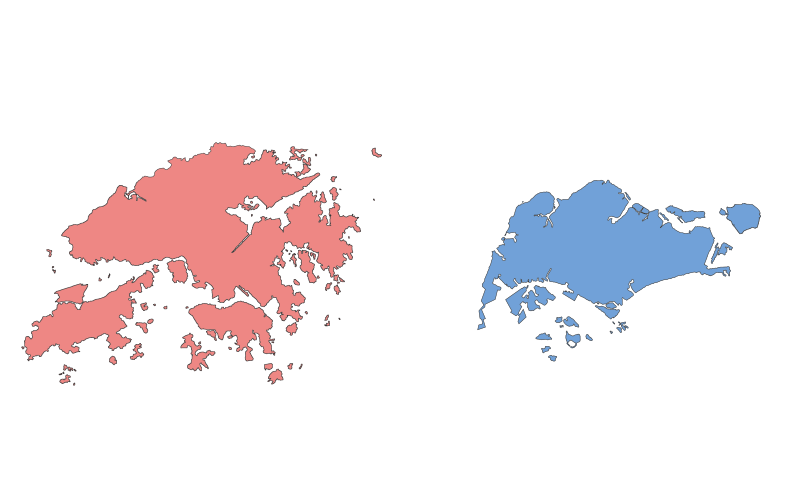香港 vs シンガポール:地理的な比較

香港 vs シンガポール:地理的な比較
1. 基本データの比較
| 項目 | 香港 | シンガポール |
|---|---|---|
| 位置 | 中国南部、珠江デルタの東側 | 東南アジア、マレー半島の南端 |
| 面積 | 約1,106 km²(陸地面積) | 約728 km²(陸地面積) |
| 気候 | 亜熱帯モンスーン気候(夏季は高温多湿、冬季は温暖) | 熱帯モンスーン気候(年間を通じて高温多湿) |
| 自然資源 | 限定的(港湾資源が主) | ほぼなし(水資源はマレーシアからの輸入に依存) |
| 都市開発 | 高密度の高層ビル群、山地が多いため開発可能地域は限定的 | 計画的都市開発、緑地化政策が進む |
| 交通機関 | MTR(地下鉄)が中心、バス・フェリーも充実 | MRT(地下鉄)が中心、バス・タクシー網が発達 |
| 主要産業 | 金融・貿易・観光 | 金融・製造業・観光 |
| 公用語 | 中国語(広東語)、英語 | 英語、中国語(北京語)、マレー語、タミル語 |
2. 詳細な説明
香港
香港は中国の特別行政区であり、1842年から1997年までイギリスの植民地でした。返還後も「一国二制度」の下で高度な自治権を保持しています。文化的には広東文化の影響が強く、言語も広東語が主流です。経済的には世界有数の金融センターとして知られ、自由貿易港としても機能しています。地理的には山がちな地形で、都市開発は沿岸部に集中しています。
シンガポール
シンガポールは1965年にマレーシアから分離独立した都市国家です。多民族国家(中華系・マレー系・インド系)であり、英語が共通語として広く使われています。経済的には東南アジアのハブとして発展し、製造業や金融業が盛んです。地理的には平坦な地形が多く、計画的に都市開発が進められています。水資源のほとんどをマレーシアに依存しているため、水の自給率向上が課題です。
共通点と相違点
両都市とも元イギリス植民地で、金融・貿易のハブとして発展しました。しかし、香港は中国の一部としての立場を強めつつあるのに対し、シンガポールは独立国家としての立場を堅持しています。気候的にはどちらも高温多湿ですが、シンガポールの方が年間を通じて気温の変動が少ないです。